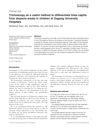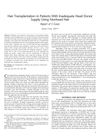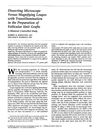Search
for
Sort by
Research
360-390 / 1000+ results
research Trichotillomania in Children and Adolescents: Review of the Literature and Case Report
The document concludes that supportive home environments and addressing parent-child interactions can effectively treat trichotillomania in children.

research Treatment of Alopecia Areata in Pre-Adolescent Children with Oral Tofacitinib: A Retrospective Study
Oral tofacitinib may effectively treat hair loss in children with alopecia areata.

research Transdermal Composite Microneedle Composed of Mesoporous Iron Oxide Nanoraspberry and PVA for Androgenetic Alopecia Treatment
Microneedle made of iron oxide and PVA helps hair regrowth in alopecia treatment.

research Medical and Aesthetic Procedural Dermatology Recommendations for Transgender Patients Undergoing Transition
Dermatologists are important in helping transgender people with skin issues and physical changes during their transition.
research Activation of TRPV3 Inhibits Lipogenesis and Stimulates Production of Inflammatory Mediators in Human Sebocytes—A Putative Contributor to Dry Skin Dermatoses
Activating TRPV3 reduces skin oil production and increases inflammation, potentially causing dry skin issues.
research Treating Alopecia Areata: Current Practices Versus New Directions
New treatments like JAK inhibitors show promise for reversing alopecia areata.

research Trichoscopy as a Useful Method to Differentiate Tinea Capitis from Alopecia Areata in Children at Zagazig University Hospitals
Trichoscopy is good for telling apart tinea capitis and alopecia areata in kids.
research Successful Hair Transplant Outcome in Cicatricial Lichen Planus of the Scalp by Combining Scalp and Beard Hair Along with Platelet Rich Plasma
Hair transplant combining scalp and beard hair with PRP was successful for scarring alopecia.

research Trichodynia: A Review of the Literature
Trichodynia is a painful scalp condition linked to hair loss and inflammation, often with anxiety, affecting more women and needing better treatment options.

research Trichoscopic Findings in Alopecia Areata and Their Relation to Disease Activity, Severity, and Clinical Subtype in Turkish Patients
Certain scalp patterns can indicate the severity and activity of hair loss in Turkish alopecia patients.
research Treatment of the Adolescent Patient with Polycystic Ovary Syndrome
More research is needed to understand the long-term benefits of insulin-sensitizing drugs for treating adolescents with PCOS.

research Altered Brain And Pituitary Androgen Metabolism By Prenatal, Perinatal Or Pre- And Postnatal Finasteride, Flutamide Or Dihydrotestosterone Treatment In Juvenile Male Rats
Treatment during development affects hormone balance and sexual behavior in male rats.

research Treatment with ImuVert and N-Acetylcysteine Protects Rats from Cyclophosphamide and Cytarabine-Induced Alopecia
N-acetylcysteine and ImuVert can prevent hair loss in rats caused by chemotherapy.

research Integrated Safety Analysis of Baricitinib in Adults With Severe Alopecia Areata From Two Randomized Clinical Trials
Baricitinib for severe alopecia areata is generally safe, with common side effects like infections and acne, and low rates of serious complications.

research Treatment of Severe Alopecia Areata with Baricitinib
Baricitinib helped a woman with severe hair loss regrow almost all her hair without side effects.

research Transcriptomic Analysis Reveals Critical Genes for the Hair Follicle of Inner Mongolia Cashmere Goat from Catagen to Telogen
Key genes regulate hair follicle phase changes in Inner Mongolia cashmere goats.

research Differential Expression and Functionality of ATP-Binding Cassette Transporters in the Human Hair Follicle
Certain transporters are found in human hair follicles and may affect hair growth and loss.

research How Effective Is Intralesional Injection of Triamcinolone Acetonide Compared with Topical Treatments in Inducing and Maintaining Hair Growth in Patients with Alopecia Areata? A Critically Appraised Topic
Intralesional triamcinolone acetonide can regrow hair in alopecia areata but often has temporary effects and side effects.

research Hair Transplantation in Patients With Inadequate Head Donor Supply Using Nonhead Hair
Nonhead hair transplantation is effective for patients with limited head donor hair, but more research is needed.
research Treatment of Alopecia Areata: What Is New on the Horizon?
New treatments for alopecia areata may target specific immune cells and pathways involved in hair loss.
research Treatment of Pseudofolliculitis Barbae with the Diode Laser
Diode laser effectively treats pseudofolliculitis barbae.

research Dissecting Microscope Versus Magnifying Loupes with Transillumination in the Preparation of Follicular Unit Grafts
Dissecting microscopes give more and better quality hair grafts than magnifying loupes.
research Topically Applied Tretinoin in the Treatment of Trichostasis Spinulosa
Using tretinoin cream on the skin can get rid of hair plugs caused by Trichostasis spinulosa.
research Assessment and Treatment Outcomes of Persistent Radiation-Induced Alopecia in Cancer Patients
Persistent radiation-induced hair loss is dose-dependent, and treatments like topical minoxidil can be effective.
research Recent Advances in the Treatment of Trichotillomania (Hair-Pulling Disorder)
New drugs like N-acetylcysteine and dronabinol show promise for treating hair-pulling disorder.

research Integrative Analysis of Methylome and Transcriptome Reveals the Regulatory Mechanisms of Hair Follicle Morphogenesis in Cashmere Goat
DNA methylation and long non-coding RNAs are key in controlling hair growth in Cashmere goats.

research Transdermal Delivery of Minoxidil Using HA-PLGA Nanoparticles for the Treatment of Alopecia
Minoxidil in HA-PLGA nanoparticles effectively treats alopecia through skin delivery.

research Transgender Adolescents and Acne: A Case Series
Testosterone treatment in transgender teens can worsen acne, requiring careful treatment due to mental health and medication side effects.

research Hormonal and Surgical Treatment Options for Transgender Women and Transfeminine Spectrum Persons
Transgender women can develop feminine traits and improve their quality of life through hormone therapy and surgery, but results vary and access to surgery can be limited.